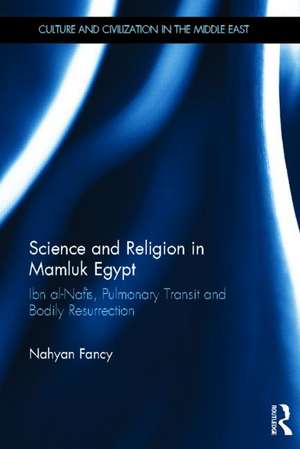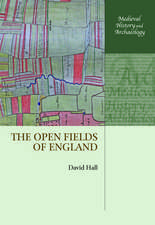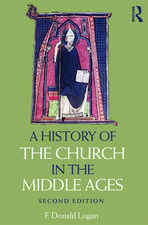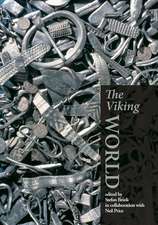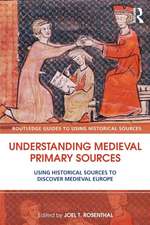Science and Religion in Mamluk Egypt: Ibn al-Nafis, Pulmonary Transit and Bodily Resurrection: Culture and Civilization in the Middle East
Autor Nahyan Fancyen Limba Engleză Hardback – 23 apr 2013
Although Ibn al-Nafīs did not posit a theory of blood circulation, he nevertheless challenged the reigning Galenic and Avicennian physiological theories, and the then prevailing anatomical understandings of the heart. Far from being a happy guess, Ibn al-Nafīs’s anatomical result is rooted in an extensive re-evaluation of the reigning medical theories. Moreover, this book shows that Ibn al-Nafīs’s re-evaluation is itself a result of his engagement with post-Avicennian debates on the relationship between reason and revelation, and the rationality of traditionalist beliefs, such as bodily resurrection.
Breaking new ground by showing how medicine, philosophy and theology were intertwined in the intellectual fabric of pre-modern Islamic societies, Science and Religion in Mamluk Egypt will be of interest to students and scholars of the History of Science, the History of Medicine and Islamic Studies.
| Toate formatele și edițiile | Preț | Express |
|---|---|---|
| Paperback (1) | 442.68 lei 6-8 săpt. | |
| Taylor & Francis – 23 iul 2015 | 442.68 lei 6-8 săpt. | |
| Hardback (1) | 1053.16 lei 6-8 săpt. | |
| Taylor & Francis – 23 apr 2013 | 1053.16 lei 6-8 săpt. |
Din seria Culture and Civilization in the Middle East
- 9%
 Preț: 1003.57 lei
Preț: 1003.57 lei -
 Preț: 310.41 lei
Preț: 310.41 lei -
 Preț: 326.49 lei
Preț: 326.49 lei -
 Preț: 415.67 lei
Preț: 415.67 lei - 18%
 Preț: 1057.89 lei
Preț: 1057.89 lei - 18%
 Preț: 1165.97 lei
Preț: 1165.97 lei - 18%
 Preț: 1168.76 lei
Preț: 1168.76 lei -
 Preț: 484.04 lei
Preț: 484.04 lei - 18%
 Preț: 1057.75 lei
Preț: 1057.75 lei - 18%
 Preț: 1068.18 lei
Preț: 1068.18 lei - 18%
 Preț: 1191.57 lei
Preț: 1191.57 lei -
 Preț: 413.13 lei
Preț: 413.13 lei - 8%
 Preț: 388.84 lei
Preț: 388.84 lei - 16%
 Preț: 272.83 lei
Preț: 272.83 lei -
 Preț: 488.51 lei
Preț: 488.51 lei -
 Preț: 418.22 lei
Preț: 418.22 lei - 26%
 Preț: 819.48 lei
Preț: 819.48 lei - 18%
 Preț: 1119.45 lei
Preț: 1119.45 lei - 18%
 Preț: 1113.60 lei
Preț: 1113.60 lei -
 Preț: 451.32 lei
Preț: 451.32 lei - 18%
 Preț: 1058.69 lei
Preț: 1058.69 lei - 15%
 Preț: 421.62 lei
Preț: 421.62 lei - 18%
 Preț: 1056.32 lei
Preț: 1056.32 lei - 18%
 Preț: 1060.87 lei
Preț: 1060.87 lei - 18%
 Preț: 1057.40 lei
Preț: 1057.40 lei - 26%
 Preț: 822.01 lei
Preț: 822.01 lei -
 Preț: 491.98 lei
Preț: 491.98 lei - 18%
 Preț: 1058.79 lei
Preț: 1058.79 lei - 18%
 Preț: 1049.19 lei
Preț: 1049.19 lei - 18%
 Preț: 998.71 lei
Preț: 998.71 lei - 18%
 Preț: 1098.11 lei
Preț: 1098.11 lei -
 Preț: 496.35 lei
Preț: 496.35 lei - 18%
 Preț: 1121.60 lei
Preț: 1121.60 lei - 18%
 Preț: 1055.32 lei
Preț: 1055.32 lei - 18%
 Preț: 1168.06 lei
Preț: 1168.06 lei - 18%
 Preț: 1168.76 lei
Preț: 1168.76 lei - 18%
 Preț: 1224.24 lei
Preț: 1224.24 lei -
 Preț: 484.47 lei
Preț: 484.47 lei - 18%
 Preț: 1062.16 lei
Preț: 1062.16 lei - 26%
 Preț: 821.10 lei
Preț: 821.10 lei - 23%
 Preț: 312.77 lei
Preț: 312.77 lei - 31%
 Preț: 763.78 lei
Preț: 763.78 lei
Preț: 1053.16 lei
Preț vechi: 1284.34 lei
-18% Nou
Puncte Express: 1580
Preț estimativ în valută:
201.52€ • 210.97$ • 166.75£
201.52€ • 210.97$ • 166.75£
Carte tipărită la comandă
Livrare economică 05-19 aprilie
Preluare comenzi: 021 569.72.76
Specificații
ISBN-13: 9780415622004
ISBN-10: 041562200X
Pagini: 200
Dimensiuni: 156 x 234 x 18 mm
Greutate: 0.41 kg
Ediția:New.
Editura: Taylor & Francis
Colecția Routledge
Seria Culture and Civilization in the Middle East
Locul publicării:Oxford, United Kingdom
ISBN-10: 041562200X
Pagini: 200
Dimensiuni: 156 x 234 x 18 mm
Greutate: 0.41 kg
Ediția:New.
Editura: Taylor & Francis
Colecția Routledge
Seria Culture and Civilization in the Middle East
Locul publicării:Oxford, United Kingdom
Public țintă
Postgraduate and UndergraduateCuprins
1 Towards a Contextualist Approach 2 Ibn al-Nafis: A Rational Traditionalist 3 Reason, Revelation, Mystical Insight and Theological Certainty Chapter 4 ‘The Soul is Connected to the Entire Body’: Hylomorphic Psychology and Nafisian Physiology 5 Fruits of a New Physiology Conclusion
Notă biografică
Nahyan Fancy is an Associate Professor of History at DePauw University, Greencastle, Indiana, USA. His research interests are in the history of science and medicine in post-1200 Islamic societies, particularly the intersections of medicine, religion and philosophy.
Recenzii
"This book should be read by any historian of pre-modern science and medicine, not only by Islamicists. Together with close readings and incisive comments of a number of key texts, we have sketches of long-term developments within the intellectual world of medieval Islam that need further research. Nahyan Fancy has succeeded admirably in combining a finished piece of work with a call for action within his field." - Leigh Chipman, Der Islam
"The book reflects fine scholarship, close acquaintance with the history of Islamic theology and philosophy, and is an important contribution to the history of medieval science, in particular through its shedding light on the creative and original contribution to medical knowledge of Islamic scholars of the post-Abbasid period, understood within the conceptual framework of their own times." - Housni Alkhateeb Shehada, Ben-Gurion University of the Negev, Bulletin of the School of Oriental and African Studies
"I recommend the book to readers interested in medieval Muslim science and philosophy." - Abdessamad Belhaj Hungarian Academy of Sciences, Budapest, Hungary
"This is an important book and one that deserves to be read by anyone interested in pre-modern theoretical medicine." - Justin K. Stearns, New York University Abu Dhabi
"Fancy offers a clear structure, going back to the most important authors before Ibn al-Naf_ıs and placing him properly in the intellectual discussions of his time." Raphela Veit, Digital Averroes Research Prject, University of Cologne
"The book reflects fine scholarship, close acquaintance with the history of Islamic theology and philosophy, and is an important contribution to the history of medieval science, in particular through its shedding light on the creative and original contribution to medical knowledge of Islamic scholars of the post-Abbasid period, understood within the conceptual framework of their own times." - Housni Alkhateeb Shehada, Ben-Gurion University of the Negev, Bulletin of the School of Oriental and African Studies
"I recommend the book to readers interested in medieval Muslim science and philosophy." - Abdessamad Belhaj Hungarian Academy of Sciences, Budapest, Hungary
"This is an important book and one that deserves to be read by anyone interested in pre-modern theoretical medicine." - Justin K. Stearns, New York University Abu Dhabi
"Fancy offers a clear structure, going back to the most important authors before Ibn al-Naf_ıs and placing him properly in the intellectual discussions of his time." Raphela Veit, Digital Averroes Research Prject, University of Cologne
Descriere
This book helps situate a ground-breaking discovery in the history of the life
sciences: the discovery of the pulmonary transit of blood, a prerequisite for William
Harvey’s fully developed theory of blood circulation three centuries later. By revealing
the social, religious, philosophical and medical contexts of this discovery, the book
illuminate the intricate ways in which science and religion interacted in the medieval
Islamic world. As such, it provides a new framework with which to challenge the
oft-repeated, but incorrect, assertion that science came to a standstill within the
Islamic world due to religious antagonism.
sciences: the discovery of the pulmonary transit of blood, a prerequisite for William
Harvey’s fully developed theory of blood circulation three centuries later. By revealing
the social, religious, philosophical and medical contexts of this discovery, the book
illuminate the intricate ways in which science and religion interacted in the medieval
Islamic world. As such, it provides a new framework with which to challenge the
oft-repeated, but incorrect, assertion that science came to a standstill within the
Islamic world due to religious antagonism.
